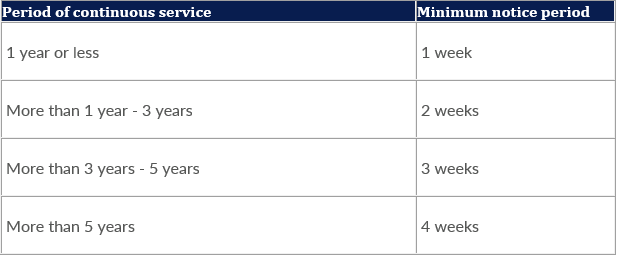Notice
Periods How do they work?
Whether an employee resigns from their position, or
they are terminated, a period of notice is generally required to be provided by
the initiating party. In other words, a notice period is the length of time
that an employee or employer must give to end the employment relationship.
Where an award or other industrial instrument does not
apply, the National Employment Standards provide the following minimum notice
periods which must:
·
be provided by an employer when terminating the
employment relationship, or
·
by an employee should they resign from their
position.
NES Minimum Notice Periods

It is important to note however that an award,
enterprise agreement or other registered agreement may set out longer
minimum notice periods that may apply (for example, 1 month instead of 1 week).
Additional notice period entitlement for employees who are over 45 years of age
An employee is entitled to receive one extra week of notice if they are over the age of 45 years and if they have worked for the employer for at least 2 years.
When do notice periods not apply?
Notice periods do not apply to employees who:
· are casual
· are employed for a specific period of time or task (e.g. a fixed term contract) and that period or task is ending at the prescribed time
· do seasonal work
· are fired because of serious misconduct (for example, where the employee is found to have engaged in wilful and deliberate conduct inconsistent with their continued employment, for example in theft,
fraud, or assault).
· have a training arrangement and are employed for a set period, or for the length of the training arrangement (other than an apprentice) and the employment relationship is ending at the conclusion of the agreed period / training agreement.
· are daily hire employees working in the building and construction, or meat industry
· are weekly hire employees working in connection
with the meat industry and whose termination depends on seasonal factors.
When does the notice period commence?
Once an employee has resigned from their employment or has been given notice of their employment ending, the notice period will run from the day after it is given to the day the employment ends.
The notice period will end on the last day of employment.
As an employer, you may elect to either:
· let the employee work out the notice period provided, or
· tell the employee to finish early and pay them in lieu of notice
If you elect to pay out the notice period in lieu, the following will apply:
· the employee’s employment will be deemed to have ceased on the date that payment in lieu of notice is made.
· the employee will not remain employed during the notice period and they will not continue to accrue entitlements, such as annual
leave.
If you elect to let the employee work out the notice period, they will continue to be employed until the completion of the provided notice period.
How to calculate payment for notice in lieu
When calculating pay in lieu of notice, the employee should receive what they would have been paid if they had remained at work. The following items should be included as part of their final pay:
· overtime worked
· penalty rates
· long service (if applicable)
· applicable loadings (i.e. leave loadings) and monetary allowances
· incentive-based payments and bonuses
· any other separate identifiable amounts
What happens if I an employee provides a greater period of notice than is required?
Should an employee provide a greater period of notice than they are otherwise required to under their contract or award, and should you not require them to, or want them to work out the greater period provided,
this should be communicated to the employee at the time the resignation is received.
What happens if I want an employee to cease their employment earlier than the previously agreed notice period?
While you could try to reach agreement with the employee for them to cease working and offering to provide payment in lieu of notice, should you direct an employee to cease their notice period at an earlier time, you may be deemed to have terminated the employment relationship opening up risk of an unfair dismissal claim should this be challenged.
What is Garden Leave and when can it be applied?
Should an employee give notice of their resignation, but you do not wish for the employee to remain in the workplace during the notice period, you may be able to place the employee on ‘garden leave’ should this be provided for in the employment agreement. During a period of garden
leave, the employee would not be required to attend the workplace, but they would continue to receive their usual remuneration during this period.
The employee will continue to remain employed by you throughout the period of garden leave and will remain bound by the terms of their employment during the period. Garden leave can be used by employers to:
· allow for both parties to separate while not creating financial hardship for either.
· protects the best business interests of the employer.
· ensure confidential information to remain safely in the hands of the employer.
· create a limited period during which the ex-employee cannot work for a competitor.
What happens if an employee does not provide the required period of notice when they resign?
An employee’s award, enterprise agreement or other registered agreement will set out:
· how much notice (if any) the employee must give when they resign
· if and when, an employer may withhold money should an employee not provide the minimum notice period required
For example, many awards provide that in certain circumstances an employer can deduct up to one week’s wages from an employee’s pay if they fail to provide the minimum amount of notice.
Where an award does allow for this, as an employer you can only deduct pay from an employee’s wages under the award. Deductions cannot be taken from other entitlements due to the employee, such as payment for
accrued leave entitlements.
In the absence of such a provision within an award or industrial instrument, as an employer you can only deduct money from an employee’s pay if:
· the employee agrees in writing, and it is principally for their benefit
· it is allowed by a law, a court order, or by the Fair Work Commission, or
· it is allowed under the employee’s award, or
· it is allowed under the employee’s registered agreement and the employee agrees to it.
If you require advice or assistance with understanding your obligations or how to manage employee notice periods upon termination, or should you require support regarding any HR matter, please contact the team at HR Advice Online at [email protected] or on 1300 720 004.
Information in HR Advice Online guides and blog posts is meant purely for educational discussion of human resources issues. It contains only general information about human resources matters and due to factors, such as government legislation changes, may not be up to date at the time of reading. It is not legal advice and should not be treated as such.





